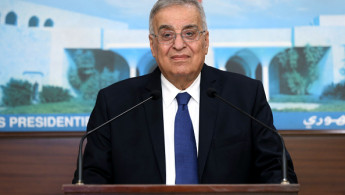Lebanon 'ready' for indirect negotiations with Israel, says FM
Lebanon's outgoing foreign minister, Abdallah Bou Habib, expressed his country's willingness to engage in "indirect negotiations with the Israelis" to reach a ceasefire amid a series of statements he made about the cross-border attacks between Hezbollah and Israel.
His comments came following a government meeting with ambassadors of member states of the UN Security Council on Monday, during which he informed that his country wants a ceasefire and an end to the war.
"We have informed concerned parties of our readiness for indirect negotiations with the Israelis for that purpose," he said, adding that there was "strong support" for Lebanon from "all sides to prevent a full-scale war".
"We did not ask the Security Council to stop the fighting, but we requested a consultative meeting that could lead to that or to stopping the targeting of civilians," he said, adding that Israel was "the one refusing [a ceasefire]".
He also highlighted that while it was "understandable" that Hezbollah would also refuse, the group was not a state actor.
"The Lebanese state is the one that says yes or no. If there is a good decision, we, as a state, will accept it and try to convince Hezbollah, which is the responsibility of the Lebanese state. Hezbollah is not a member of the United Nations, but Lebanon is, and Hezbollah stands with us on this matter," he added.
Government sources cited by The New Arab's Arabic-language sister site, Al-Araby Al-Jadeed, said that there was no official comment on Bou Habib's statement. However, one source noted that the position expressed by the foreign minister was aligned with that of outgoing Prime Minister Najib Mikati.
The official position expressed by Mikati has been reflective of Hezbollah's stance, which had linked the cross-border attacks between the group and Israel to the war on Gaza.
Several ministers contacted by Al-Araby Al-Jadeed's correspondent to comment on Bou Habib's latest statement said they shared the official position represented by Mikati.
In November, Hezbollah's Hassan Nasrallah stated that his group's operations against northern Israel were "in solidarity" with the people of Gaza.
"We will not comment on Bou Habib's statements," one of the ministers aligned with Hezbollah told Al-Araby Al-Jadeed. "[Hezbollah's] position is well-known. There will be no negotiations until Israel's aggression on Gaza stops."
The minister said the group would continue its operations against northern Israel until a ceasefire deal on Gaza is reached.
"Hezbollah has MPs in parliament and ministers in the government who express its stance, and any indirect political negotiations conducted by the state, like those during the maritime border demarcation, are its own matter. However, there will be no formal negotiations before the aggression on Gaza ends," the minister added.
Government sources also told Al-Araby Al-Jadeed that indirect channels "have long been open through the United Nations and major powers, including US Presidential Envoy Amos Hochstein to negotiate an end to Israeli aggression on Lebanon and prevent the expansion of the war".
Bou Habib, who was appointed as minister of foreign affairs and expatriates in 2021, is politically affiliated with the Free Patriotic Movement, led by MP Gebran Bassil, which opposes "dragging Lebanon into wars that are not in its interest".
In March, he said Lebanon was "ready to carry out indirect negotiations" with Israel, adding that the only other option would be to risk dragging the region into war.
Speaking at the Antalya Diplomatic Forum in Turkey, Bou Habib said the Lebanon-Israel border would be stable and secure if "Israel withdraws from the contested Shebaa Farms area and Kfarchouba hills" and ends its "daily violations" against Lebanon.
Meanwhile, on Tuesday, Israel's defence minister, Yoav Gallant, said his country would shift focus from Gaza to the "northern front" once its objectives in the besieged enclave were achieved.
"The center of gravity is moving to the north, we are nearing the completion of our missions in the south, but we have a task here that has not been carried out, and this mission is to change the security situation and return the residents to their homes," he told reservists of the Oded Brigade in northern Israel.
Some 60,000 Israelis have been displaced from their homes as a result of daily cross-border attacks between Hezbollah and Israeli forces, which began on 8 October last year.
Israeli attacks on Lebanon have killed over 70 civilians, including children, and some 300 fighters, including Hezbollah members as well as members of other groups carrying out operations against Israel from Lebanon.





 Follow the Middle East's top stories in English at The New Arab on Google News
Follow the Middle East's top stories in English at The New Arab on Google News


